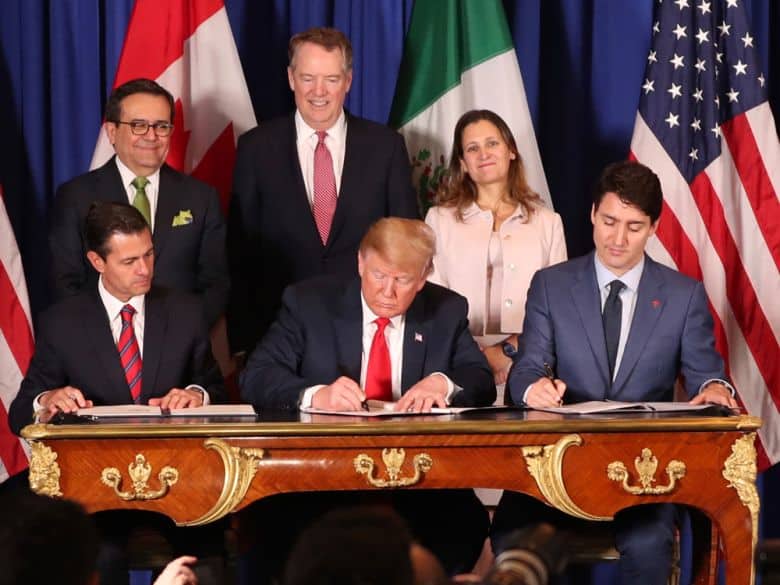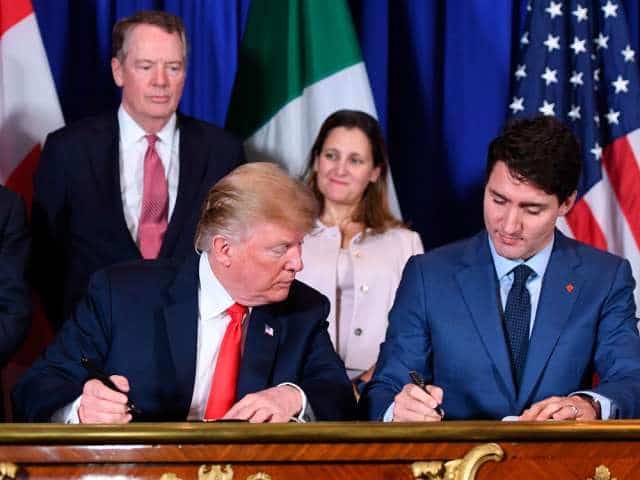
President Trump is certain the deal will be ratified by Congress, but then again, he may also threaten to withdraw
Prime Minister Justin Trudeau signed off on a new trilateral trade deal with the United States and Mexico Friday, ending a 15-month chapter of difficult negotiations while simultaneously opening up rocky new one in which U.S. President Donald Trump will face the “Herculean task” of getting the pact approved by Congress.
Doubts about whether Trudeau would sign the deal unless U.S. tariffs on Canadian steel and aluminum imports were removed continued right up until the morning ceremony on the sidelines of the G20 Summit in Buenos Aires.
In the end, the countries signed off on the pact to replace the North American Free Trade Agreement with the levies intact — leaving Canada and Mexico to continue their fight against them in the coming months.
Trudeau, standing alongside U.S. President Donald Trump and Mexican President Enrique Pena Nieto, said the new pact “lifts the risk of serious economic uncertainty that lingers throughout a trade renegotiation process, uncertainty that would only have gotten worse and more damaging had we not reached a new NAFTA.”
Referencing the recent closure of General Motors plants in Oshawa, Ont. and the United States, he then addressed Trump directly: “Donald, it’s all the more reason we need to keep working to lift the tariffs on steel and aluminum between our two countries.”
For his part, Trump made no mention of the tariffs and indeed, expressed optimism that the deal would win approval from U.S. lawmakers.
“It’s been so well-reviewed I don’t expect to have much of a problem,” he said.
For Trump, who campaigned on renegotiating NAFTA, the new pact represents the biggest victory in his America First trade agenda. But the deal still requires ratification by all three countries and while Canada and Mexico are expected to pass it easily, it faces a much “bumpier ride” to approval in the Democrat-controlled U.S. Congress, said Dan Uzcjo, an Ohio-based trade lawyer with Dickinson Wright.
Following widespread wins in the U.S. mid-term elections, Democrats were quick to criticize the strength of and the ability to enforce the new deal’s labour and environmental standards, with some warning that new minimum wage rules in the deal’s auto chapter — requiring 40 to 45 per cent of production be done by workers earning at least US$16 an hour — may not be enough to prevent U.S. manufacturing jobs from moving to Mexico.

The deal is also facing new resistance from Trump’s own party, with House Republicans taking aim at provisions designed to prevent discrimination on the basis of sex, including sexual orientation and gender identity. Those challenges, together with ongoing investigations of the Trump campaign, make the chances of ratification by March — the earliest possible date under U.S. procedures — very unlikely, Uzcjo said.
“I think it’s going to be a Herculean task to get this through Congress,”he said. “The reality is that other domestic issues such as investigations, the Democrats’ own agenda on health care and immigration will trump the president’s trade agenda next year. I just don’t think there will be enough oxygen in the room for this.”
For Canada, signing on to the deal meant accepting an arrangement that gave Ottawa few of the things it wanted — including more access to U.S. government procurement contracts — but offered some protection against economic uncertainty and future tariffs on autos, said Patrick LeBlond, an associate professor in international affairs at the University of Ottawa. Indeed, Trudeau will enter 2019, an election year, with a deal in hand just as the North American economy shows signs of moving past its peak, LeBlond said.
The USMCA also contains an important protection for Canada: a side letter exempting 2.6 million vehicles and US$32.4-billion worth of auto parts from any future U.S. tariffs on autos.The tariffs are expected to be a key point of leverage for the Trump administration as it moves into trade negotiations with Japan and the European Union. And this week Trump announced he was “studying” the levies, suggesting they could prevent job cuts such as those announced by GM.
… it’s going to be a Herculean task to get this through Congress. Other domestic issues will trump the trade agenda next year. I don’t think there will be enough oxygen in the room for this
Dan Uzcjo, U.S. trade lobbyist, Dickinson Wright
“This wasn’t the deal we wanted, but I think we had to sign it,” said LeBlond. “It was us playing defence and that’s not how we usually see these things, but this is the U.S. administration we were dealing with.”
Canada will have to continue its fight against the steel and aluminum tariffs, however, even as Trump faces rising domestic pressure to drop them. The levies, which Trump tied to a successful renegotiation of NAFTA, but has since refused to remove, are squeezing downstream U.S. manufacturers and processors. Canada and Mexico have both struck back with retaliatory tariffs on U.S. products, with the Mexican levies specifically targeting U.S. farmers.
But that doesn’t mean Trump will let go of them easily, especially without insisting on quotas in their place, said Gary Hufbauer, a senior fellow at the Peterson Institute for International Economics. In all, the steel tariffs have elevated prices to 20 per cent above world levels, according to a calculation by Hufbauer. Trump, who has credited the levies with reviving the American steel industry, “will want to preserve that,” he said.
“I think it’ll be quite a battle and it will end with quotas,” said Hufbauer.
While the USMCA will ultimately be passed, vigorous resistance from Congress could see Trump reignite old threats to withdraw from NAFTA, Hufbauer believes. That could lead to various court challenges and other delays, but will ultimately see an agreement forged in the U.S., he added.
“It’ll get ratified eventually, but I do expect Trump to pull out the threat to withdraw,” he said.


